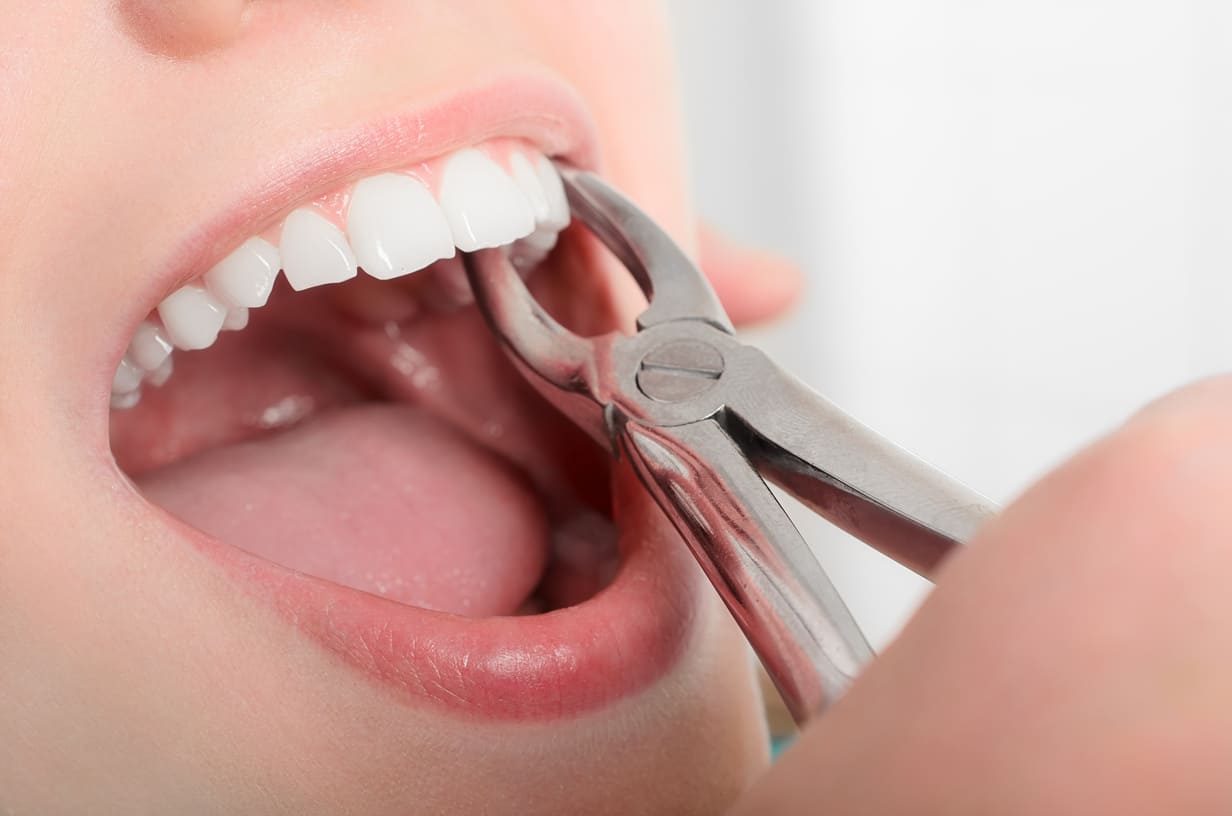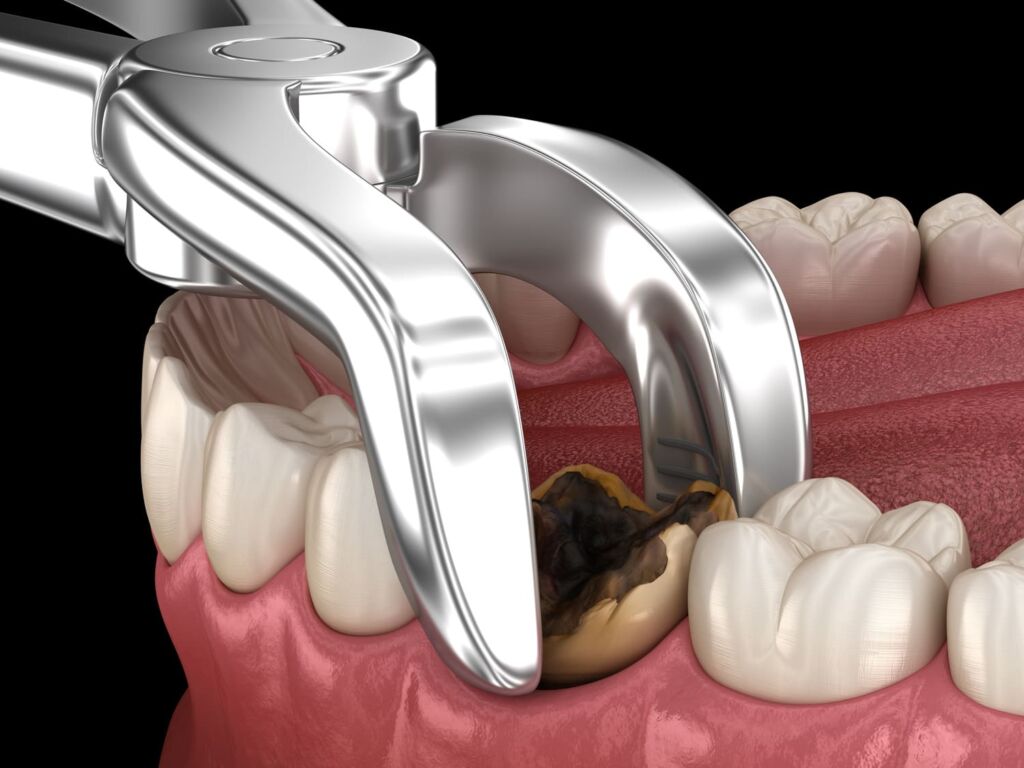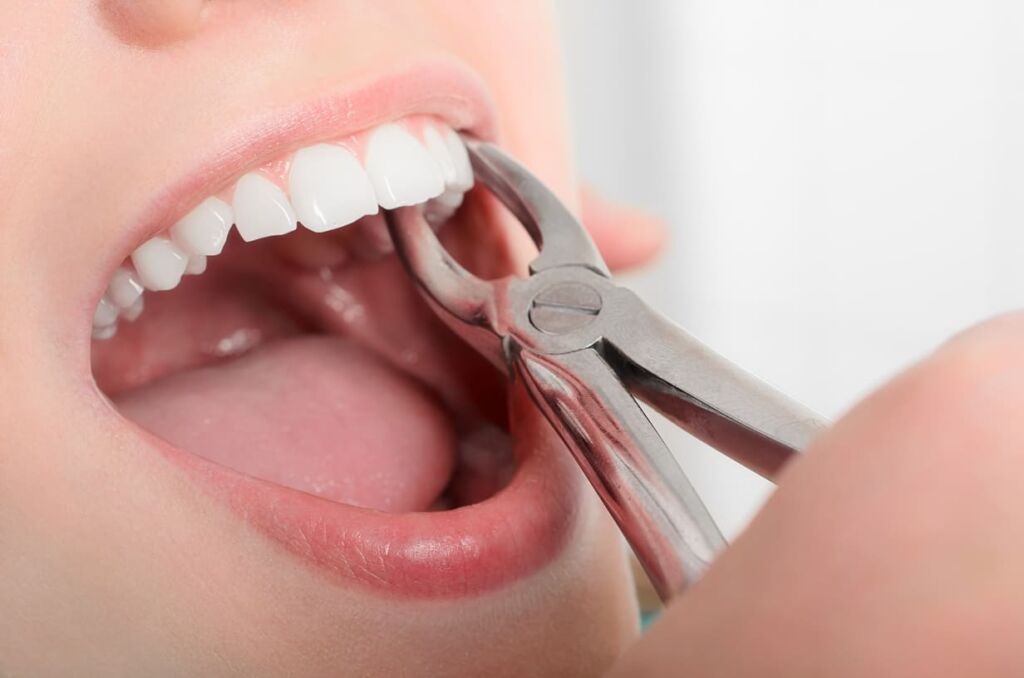Tooth Extractions In Georgetown

Tooth Extractions In Georgetown
Tooth extractions may be necessary for several reasons, including severe damage or decay. Regardless of the reason, Mill Street Dental can complete this dental procedure to help eliminate pain and restore your smile.
Extractions are one of the most common dental procedures at Mill Street Dental Studio In Georgetown. This treatment can eliminate bacteria and improve your overall oral health. During this procedure, a tooth is completely removed from its socket, which can feel daunting and even scary. Do not fear, however, as our dentist has years of experience and is highly trained to perform extractions safely. Tooth extraction is a fairly standard dental procedure. We will help our patients prepare if this procedure is required.
When is Tooth Extraction Necessary?
We will always try to save natural teeth whenever possible, but removal may be recommended if that is not possible. We will first assess the situation to determine if we can repair a broken or damaged tooth with a filling, crown or other dental treatment. We will discuss extraction if the damage is too severe and beyond repair.
Tooth extraction may be necessary if decay or infection has reached deep into the tooth or in the event of trauma or injury. Suppose there is not enough room for all teeth in your mouth. In that case, extraction may be necessary, and the same is true if a patient’s baby teeth do not fall out in time for the permanent teeth to come in or if your orthodontic treatment requires extraction to make room for your teeth as they shift into place.
Wisdom teeth extraction is very common; these teeth are the third molars located at the back of your teeth. They are often extracted before or after they come in.
Preparation
We will first review your medical and dental history and take X-rays to get a closer look at the length, shape, and position of the tooth and your surrounding bone. We will determine the way to remove your tooth from this information, and if that is the course of action, we will schedule extraction.
Process
Using a local anesthetic, we will numb the area around your tooth the day of the procedure. If a more complicated extraction is required, intravenous anesthesia (IV) may be administered, which can range from conscious sedation to general anesthesia, which will put the patient to sleep. In these situations, you will need a friend or family member to drive you home after your procedure, and they should also stay with you until the effects wear off.
Once the anesthesia kicks in, we will gently loosen your tooth using specialized dental instruments and carefully lift it from its socket. We may need to make incisions in your gums to access your tooth, and this is usually the case if a tooth is badly decayed or has broken off at the gum line. Once the tooth is removed, we will clean and disinfect the socket, and stitches may be placed to help heal.
There are two types of extractions, including the following:
Simple extraction
This refers to the removal of a tooth that is visible in your mouth. A general dentist can perform simple extractions, and they will numb the tooth and gum tissue and loosen the tooth with a dental instrument called an elevator before removing it with dental forceps.
Surgical extraction
This refers to a more complex procedure and is necessary when a tooth has broken off at the gum line or has not come into the mouth yet. A small incision will be made into your gum to remove the underlying tooth.
After Extraction

You must keep the area clean after a tooth extraction to prevent infection. We may ask you to bite down gently on a piece of dry, sterile gauze that should be kept for about 45 minutes to limit bleeding. We will provide you with detailed aftercare instructions, and you must not smoke, rinse your mouth vigorously or clean any teeth next to the extraction site for 24 hours following your procedure.
Some pain and discomfort are very normal following tooth extraction, and we may recommend a painkiller or prescribe one for you. Applying an ice pack to your cheek can also help, as this can reduce any swelling. In most cases, discomfort and pain should disappear within three days to two weeks, but if you experience prolonged or severe pain, swelling, bleeding or fever, please call our office right away.
We will discuss all of the steps you must take to ensure a speedy recovery and will provide you with a list of post-surgical instructions, which will include the following:
1. Keep the extraction site clean – Rinse the area gently with an antimicrobial mouthwash two to three times a day, and avoid brushing directly over your extraction site until we give you the green light. You can brush and floss the other areas of your mouth normally.
2. Take all medications as directed – We may prescribe antibiotics and pain relievers. You must take these medications exactly as directed. You can also take over-the-counter pain relievers like ibuprofen.
3. Avoid strenuous activity – An elevated heart rate can lead to increased post-operative bleeding and discomfort, so you should avoid strenuous activity for at least two days. Do not rush to the gym and speak to us before you resume normal routines; we will confirm if it is safe.
Regarding your diet, we recommend avoiding crunchy foods for the first few days following extraction. Stick to soft foods like rice, pasta and yogurt and do not drink through straws because this motion can dislodge blood clots and cause dry sockets.
Most patients can return to work or school within a day or two following their extraction procedure. However, if your job requires heavy lifting or physical labour, you may need to take a few more days off work.
Following our advice and recommendations will ensure fast recovery time, and we will provide you with detailed information regarding pre and post-extraction care tips.
Benefits of Tooth Extraction
Having a tooth pulled may not sound like fun, but it can offer a number of benefits. It can help reduce harmful bacteria that damage your teeth and gums. It can remove a decayed or damaged tooth, which can otherwise wreak havoc on your smile and lead to several more problems.
Removing an affected tooth can lead to optimal oral health, and a tooth extraction can help ease dental pain, especially if the tooth is severely broken or infected. This procedure will only be done if necessary, and if extraction is the only way to save your smile, we will discuss why and provide you with every detail to help you prepare.
Contact Mill Street Dental today!
If you are experiencing a toothache or dental pain, contact Mill Street Dental Studio to schedule an appointment. We will determine the cause of your pain and discuss the treatment. We create personalized treatment plans for our patients, and if extraction is necessary, we will discuss every detail, answer your questions, and address any concerns.
Hearing that you need to have a tooth pulled is difficult, and we understand why many people fear extraction. Sometimes, this is the only way to restore your smile, and we will eliminate your fears by helping you prepare and discuss what to expect. Tooth extraction can eliminate infection and help with your oral health. In some cases, extraction is the only option. If you are in the stages of periodontal disease or severe decay or are suffering from an unsalvageable tooth, removing your tooth may be the good option for oral health.
Tooth extractions are safe if completed by a reputable dentist in Georgetown. You can depend on our dentist for this treatment. We will ask you about your medical history to ensure you don’t have any health conditions that might make you more susceptible to infection.
Depending on which tooth we must remove, we can also discuss replacement options like dentures, a bridge or a permanent dental implant. We want you to have a smile you love and will discuss how we can replace the extracted tooth and which option is good. A healthy smile will boost your confidence, and you will not only look better, but you will also feel better overall.
We will do everything possible to ensure your tooth extraction procedure is safe and painless. We will prioritize your safety throughout the procedure.
If you are looking for a reputable dentist near you in Georgetown or are suffering from a dental emergency, contact our dental studio right away!
Tooth Extractions In Georgetown
Tooth extractions may be necessary for several reasons, including severe damage or decay. Regardless of the reason, Mill Street Dental can complete this dental procedure to help eliminate pain and restore your smile.
Extractions are one of the most common dental procedures at Mill Street Dental Studio In Georgetown. This treatment can eliminate bacteria and improve your overall oral health. During this procedure, a tooth is completely removed from its socket, which can feel daunting and even scary. Do not fear, however, as our dentist has years of experience and is highly trained to perform extractions safely. Tooth extraction is a fairly standard dental procedure. We will help our patients prepare if this procedure is required.
When is Tooth Extraction Necessary?

We will always try to save natural teeth whenever possible, but removal may be recommended if that is not possible. We will first assess the situation to determine if we can repair a broken or damaged tooth with a filling, crown or other dental treatment. We will discuss extraction if the damage is too severe and beyond repair.
Tooth extraction may be necessary if decay or infection has reached deep into the tooth or in the event of trauma or injury. Suppose there is not enough room for all teeth in your mouth. In that case, extraction may be necessary, and the same is true if a patient’s baby teeth do not fall out in time for the permanent teeth to come in or if your orthodontic treatment requires extraction to make room for your teeth as they shift into place.
Wisdom teeth extraction is very common; these teeth are the third molars located at the back of your teeth. They are often extracted before or after they come in.
Preparation
We will first review your medical and dental history and take X-rays to get a closer look at the length, shape, and position of the tooth and your surrounding bone. We will determine the way to remove your tooth from this information, and if that is the course of action, we will schedule extraction.
Process
Using a local anesthetic, we will numb the area around your tooth the day of the procedure. If a more complicated extraction is required, intravenous anesthesia (IV) may be administered, which can range from conscious sedation to general anesthesia, which will put the patient to sleep. In these situations, you will need a friend or family member to drive you home after your procedure, and they should also stay with you until the effects wear off.
Once the anesthesia kicks in, we will gently loosen your tooth using specialized dental instruments and carefully lift it from its socket. We may need to make incisions in your gums to access your tooth, and this is usually the case if a tooth is badly decayed or has broken off at the gum line. Once the tooth is removed, we will clean and disinfect the socket, and stitches may be placed to help heal.
There are two types of extractions, including the following:
Simple extraction
This refers to the removal of a tooth that is visible in your mouth. A general dentist can perform simple extractions, and they will numb the tooth and gum tissue and loosen the tooth with a dental instrument called an elevator before removing it with dental forceps.
Surgical extraction
This refers to a more complex procedure and is necessary when a tooth has broken off at the gum line or has not come into the mouth yet. A small incision will be made into your gum to remove the underlying tooth.
After Extraction

You must keep the area clean after a tooth extraction to prevent infection. We may ask you to bite down gently on a piece of dry, sterile gauze that should be kept for about 45 minutes to limit bleeding. We will provide you with detailed aftercare instructions, and you must not smoke, rinse your mouth vigorously or clean any teeth next to the extraction site for 24 hours following your procedure.
Some pain and discomfort are very normal following tooth extraction, and we may recommend a painkiller or prescribe one for you. Applying an ice pack to your cheek can also help, as this can reduce any swelling. In most cases, discomfort and pain should disappear within three days to two weeks, but if you experience prolonged or severe pain, swelling, bleeding or fever, please call our office right away.
We will discuss all of the steps you must take to ensure a speedy recovery and will provide you with a list of post-surgical instructions, which will include the following:
- Keep the extraction site clean – Rinse the area gently with an antimicrobial mouthwash two to three times a day, and avoid brushing directly over your extraction site until we give you the green light. You can brush and floss the other areas of your mouth normally.
- Take all medications as directed – We may prescribe antibiotics and pain relievers. You must take these medications exactly as directed. You can also take over-the-counter pain relievers like ibuprofen.
- Avoid strenuous activity – An elevated heart rate can lead to increased post-operative bleeding and discomfort, so you should avoid strenuous activity for at least two days. Do not rush to the gym and speak to us before you resume normal routines; we will confirm if it is safe.
Regarding your diet, we recommend avoiding crunchy foods for the first few days following extraction. Stick to soft foods like rice, pasta and yogurt and do not drink through straws because this motion can dislodge blood clots and cause dry sockets.
Most patients can return to work or school within a day or two following their extraction procedure. However, if your job requires heavy lifting or physical labour, you may need to take a few more days off work.
Following our advice and recommendations will ensure fast recovery time, and we will provide you with detailed information regarding pre and post-extraction care tips.
Benefits of Tooth Extraction
Having a tooth pulled may not sound like fun, but it can offer a number of benefits. It can help reduce harmful bacteria that damage your teeth and gums. It can remove a decayed or damaged tooth, which can otherwise wreak havoc on your smile and lead to several more problems.
Removing an affected tooth can lead to optimal oral health, and a tooth extraction can help ease dental pain, especially if the tooth is severely broken or infected. This procedure will only be done if necessary, and if extraction is the only way to save your smile, we will discuss why and provide you with every detail to help you prepare.
Contact Mill Street Dental today!
If you are experiencing a toothache or dental pain, contact Mill Street Dental Studio to schedule an appointment. We will determine the cause of your pain and discuss the treatment. We create personalized treatment plans for our patients, and if extraction is necessary, we will discuss every detail, answer your questions, and address any concerns.
Hearing that you need to have a tooth pulled is difficult, and we understand why many people fear extraction. Sometimes, this is the only way to restore your smile, and we will eliminate your fears by helping you prepare and discuss what to expect. Tooth extraction can eliminate infection and help with your oral health. In some cases, extraction is the only option. If you are in the stages of periodontal disease or severe decay or are suffering from an unsalvageable tooth, removing your tooth may be the option for oral health.
Tooth extractions are safe if completed by a reputable dentist in Georgetown. You can depend on our dentist for this treatment. We will ask you about your medical history to ensure you don’t have any health conditions that might make you more susceptible to infection.
Depending on which tooth we must remove, we can also discuss replacement options like dentures, a bridge or a permanent dental implant. We want you to have a smile you love and will discuss how we can replace the extracted tooth. A healthy smile will boost your confidence, and you will not only look better, but you will also feel better overall.
We will do everything possible to ensure your tooth extraction procedure is safe and painless. We will prioritize your safety throughout the procedure.
If you are looking for a reputable dentist near you in Georgetown or are suffering from a dental emergency, contact our dental studio right away!
